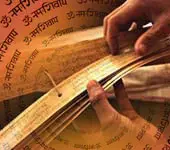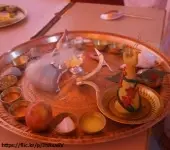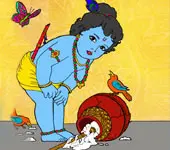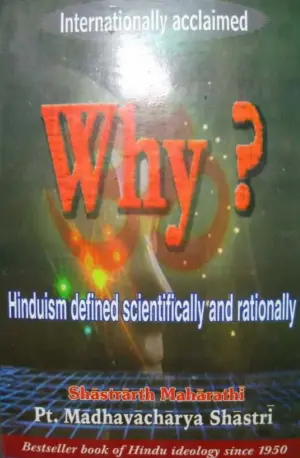Scientific Hindu
Sanatana Dharma is a vast and complex subject, with many different facets and nuances to explore. This book aims to provide readers with a factual and logical explanation of some of the most important topics in this ancient tradition, drawing on scriptural authority to provide a solid foundation for understanding. From the nature of the divine and the purpose of human existence, to the role of karma and dharma in shaping our lives, this book covers a wide range of topics that are essential for anyone seeking to deepen their understanding of Sanatana Dharma.
Click here to read PDF Book
Recommended for you
Importance of Annadaana explained in Veda-Part 3
 Click here to know more..
Click here to know more..
Why Prahlada Could Not Be Killed

Hiranyakashipu tried a lot to kill Prahlada. But nothing worked. Learn why.....
Click here to know more..Govindashtakam

सत्यं ज्ञानमनन्तं नित्यमनाकाशं परमाकाशं गोष्ठप्राङ्ग�....
Click here to know more..Excerpt
Excerpt
ELIGIBILITY CRITERIA FOR SOLEMNISATION OF CEREMONIES
Each thing in this world is perfect and benevolent (Siva). These are made for the good of human beings yet these are classified into two categories, ie. good and bad. This division may be done on the basis of eligibility and ineligibility. We know that Ghee is a nutritious food yet it is not equally good for all persons. In the common state, it ensures longevity to a man by providing him with power and force (energy) while it acts as a messenger to death for people suffering from diarrhea, fever, and asthma. Similarly, the curd is greasy, cool, and energizing food as per material science but these properties remain only till it is kept in a vessel made up of glass, soil, or stone. It becomes toxic if kept on a vessel made up of copper or brass. If someone sips such curd, he will immediately suffer from vomiting sensation and giddiness.
Evidently, consideration of eligibility is a must for each and every material thing of this world and our learned authors of scriptures have honored this rule like rules made for society in Vedic processes. The ancient sages have developed criteria based on eligibility in spite of every man having the right to solemnize the ceremonies because these are indiscriminately applied on all human beings. Revered Yajnavalkya has stated-
ब्रह्मक्षत्रियविट्शूद्रा वर्णास्त्वाद्यास्वयो द्विजा । निषेकादिश्मशानान्तास्तेषां वै मन्त्रतः क्रियाः । शूद्रोऽप्येवंविधः कार्यो बिना मन्त्रेण संस्कृतः ।। ।
Viz. The three dvijas ie. Brahmana, Ksatriya, Vaisya should solemnize all ceremonies starting from insemination and ending with funeral in a systematic manner with reciting hymns but the Südras should do them without reciting hymns.
WHY IS SUCH DISCRIMINATION MADE?
Several people consider this discrimination or distinction based on hatred feeling for Sudras but there is not even a smell of any hate. Instead, it is like a concession given by learned sages because of the excess workload on Südras. So far as results or fruits are concerned, Suidra will get it in the same quantum as Brahmana and it even without reciting hymns. The second reason for the same is of being Südras unable to do pure recitals as most of them are illiterate. When this is the position, prejudicial results are not ruled-out..
Hence, Südras are prohibited to recite hymn while solemnizing the ceremonies.
WHETHER IT IS RIGHT OR A BURDEN?
The root cause of conflict in each and every kind in the modern age is that of the right factor inherent to it. One says why has he not been given the right to put sacred thread on the shoulder? The other says why has he not been given the right to enter into Samyasa Asrama duly with a trident or a stick in hand. This is the conflict in the matters of religion, very right has become a cause of tension and conflict between the classes like workers and mill owners, peasants and landlords, students and teachers, ruler and ruled subjects, and even between a wife and her husband when putting a cursory look on the economic world. Battles are being fought in the name of right everywhere and between all people, institutions, agencies, and countries. Our learned sages came across the essence of duty in Vedas emanated out from the exhaling of almighty in the moments the learned hermits were engrossed in sheer meditation if the man could resort to understand his duty and engage with loyalty in its performance: the class conflicts, wars disputes, quarrels, family feuds, etc. destructive scenes shall not emerge and all will enjoy unity and integrity in its real meaning
In case, we accept the existence of authority or the consciousness of right even for a moment, it fuels the tendency of less labor but much profit resulting in all kinds of conflicts and tensions. This tendency on one side creates dissolution of the organization and proves a hurdle in catering to the need of the nation. This is the reason, all scriptures of Santana Dharma are classified not on the basis of right but on the basis of compliance with the duty. For example, the Brahmapa is not given rights but studying on Veda is his duty which he should perform even if he is starving. The Ksatriya is not only conferred with the right to battle for his motherland but it is his duty to offer his head for the defense of nation, race, and religion. This lability is on his shoulders put by the almighty. One should understand it clearly that the authority is independent in using his right under free discretion while analyzing the duty and right. However, one has to hold liability under the compulsion of his duty. This is the reason that the Brahmana caste has kept the study and preach system of Vedas all alive happily living even in the state of poverty so acute as that of Sudāmā.
A Lakh of Indian scholars have understood their duty and never allowed their sons to adopt the English pattern of schooling deliberately. They had neglected earning prosperity on the strength of English schooling which could make their sons Doctors, pleaders, Engineers, etc. The struggles that ensued against the Mughals by Rajput kings are the burning examples of the sense of duty inherent to them. They had put saffron garments on the body and fought bravely unto death. The man should, therefore, observe and analyze every activity in perspective of his duty and not of the right he should have on them. This habit can be made gradually.
One should do like the abovesaid things, consider in perspect of ceremonies the questions like-which? When ? How? and What? He should develop a trend to ask all these questions while pondering upon scriptures. Whatever then suggested by scripture. he should promptly engage himself in doing the same. The things forbidden by scriptures should be avoided. Remember that as violence of the procedure for doing things as suggested in scriptures amounts an evil, the act on forbidden things is also tantamounted to evil. As a soldier or policeman is ordered to put a special type of uniform and he is able to punishment if found without uniform on duty, the common people are also liable to punishment if they put police man's uniform and found extorting the innocent villagers.

English Topics
Spiritual books
Click on any topic to open
- 30 Adhyatma Ramayana - English Translation
- 29 Kathakali - The Dance Of Kerala
- 28 Varanasi Down the Ages: Tracing the Evolution of India's Spiritual Capital
- 27 Vedas With Meaning
- 26 Valmiki Ramayanam
- 25 Sapthagiri - January - 2019
- 24 Vedas On Marriage - Emancipation Of Woman
- 22 Scientific Hindu
- 21 What Is Hinduism?
- 20 Antyeshti - Death Rituals
Please wait while the audio list loads..
30
Ganapathy
Shiva
Hanuman
Devi
Vishnu Sahasranama
Mahabharatam
Practical Wisdom
Yoga Vasishta
Vedas
Rituals
Rare Topics
Devi Mahatmyam
Glory of Venkatesha
Shani Mahatmya
Story of Sri Yantra
Rudram Explained
Atharva Sheersha
Sri Suktam
Kathopanishad
Ramayana
Mystique
Mantra Shastra
Bharat Matha
Bhagavatam
Astrology
Temples
Spiritual books
Purana Stories
Festivals
Sages and Saints

